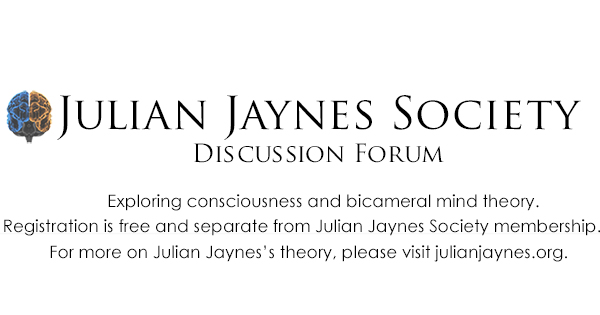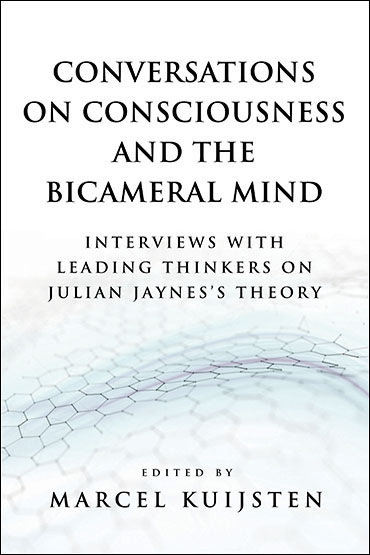"Julian Jaynes, the Bicameral Mind, and the Origin of Consciousness," an interview with JJS Founder Marcel Kuijsten by Henrik Palmgren for Red Ice Radio. To listen to the full 100-minute interview and many other interviews and lectures on Julian Jaynes's theory, please join the Julian Jaynes Society.
Includes discussion of the problem of consciousness, what is consciousness is and is not according to Julian Jaynes, the importance of metaphorical language and writing, features of consciousness, Nicholas Humphrey's research on cave art and autism, evidence from the Iliad, ancient bicameral civilizations, the Thera explosion and ensuing tsunami, and Michael Carr's research on the bicameral mind in China. In the second hour, Marcel Kuijsten discusses the role of drugs, entheogens, hallucinogens in eliciting bicameral hallucinations, the importance of dreams in documenting the transition from bicamerality to consciousness, the origin of religion and the bicameral mind, and more. Also discussed is the significance to the theory of religious figures like Moses, Jesus and Muhammad, to more modern people like William Blake, Emanuel Swedenborg and Joseph Smith.
Read Marcel Kuijsten's books on Julian Jaynes's theory:
Conversations on Consciousness and the Bicameral Mind: Interviews with Leading Thinkers on Julian Jaynes's Theory
Gods, Voices, and the Bicameral Mind: The Theories of Julian Jaynes
The Julian Jaynes Collection
Reflections on the Dawn of Consciousness: Julian Jaynes's Bicameral Mind Theory Revisited
Please sign up or login to watch the full version in the JJS Member Area.
Marcel Kuijsten - Julian Jaynes, the Bicameral Mind, and the Origin of Consciousness
Section for discussing interviews related to Julian Jaynes's theory of the origin of consciousness and a previous bicameral mentality.
Return to “Interview and Q&A Discussion”
Jump to
- JJS Forum
- ↳ General Discussion
- ↳ News Items Related to Jaynes's Theory
- ↳ Book Discussion: The Origin of Consciousness and Julian Jaynes Society Publications
- ↳ Myths, Misconceptions, and Fact Checks About Julian Jaynes's Theory
- ↳ Brian J. McVeigh's Random Thoughts
- ↳ Julian Jaynes
- ↳ Conferences, Events, and Local Discussion Groups
- ↳ Lecture Discussion
- ↳ Interview and Q&A Discussion
- ↳ 1.0. Hypothesis One: Consciousness Based On Language
- ↳ 1.01. Hypothesis One: Consciousness Based On Language | Subtopic: Consciousness & Dreams
- ↳ 1.02. Hypothesis One: Consciousness Based On Language | Subtopic: Consciousness in Children
- ↳ 1.03. Hypothesis One: Consciousness Based On Language | Subtopic: Consciousness and AI
- ↳ 2.0. Hypothesis Two: The Bicameral Mind
- ↳ 2.1. Hypothesis Two: The Bicameral Mind | Subtopic: Auditory Hallucinations in Normal Adults
- ↳ 2.2. Hypothesis Two: The Bicameral Mind | Subtopic: Hallucinations & Imaginary Companions in Children
- ↳ 2.3. Hypothesis Two: The Bicameral Mind | Subtopic: Hypnosis, Possession & Altered States of Consciousness
- ↳ 2.4. Hypothesis Two: The Bicameral Mind | Subtopic: Religion & the Bicameral Mind
- ↳ 2.5. Hypothesis Two: The Bicameral Mind | Subtopic: Schizophrenia
- ↳ 2.6. Hypothesis Two: The Bicameral Mind | Subtopic: The Mentality of Pre-Literate & Pre-Modern Peoples
- ↳ 3.0. Hypothesis Three: Dating the Development of Consciousness
- ↳ 4.0. Hypothesis Four: Jaynes's Neurological Model for the Bicameral Mind
- ↳ The Bicameral Mind in Fiction, Film & Popular Culture
- ↳ Information for Students


